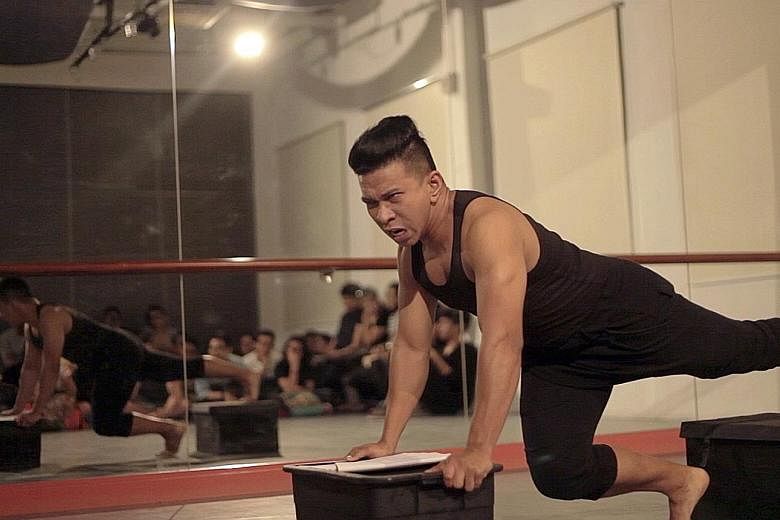REVIEW / THEATRE
PROJEK SUITCASE: METAMORPHOSIS
Teater Ekamatra
Aliwal Arts Centre/Last Friday and Saturday
British soldiers in World War I used to sing "pack up your troubles in your old kit-bag" whenever they marched.
In Projek Suitcase, however, Teater Ekamatra's artistic director Mohd Fared Jainal asked eight directors to work with eight actors to reveal, in a series of 20-minute monologues, all the emotional baggage their characters had.
The monologues ran two at a time, simultaneously, so one could catch up to four of these nightly.
In Kulit On The Go (kulit being Malay for skin), livewire actor Erwin Shah Ismail, collaborating with Peranakan dramatist Richard Tan, portrayed a lovestruck leather craftsman like a yee-ha cowboy, giving onlookers a crash course in how to fashion cowhide into accessories.
He warbled away, with impressive smatterings of Hokkien, Cantonese and drawling American English, while he cut and polished a strip of leather and they learnt that he had become an artisan because he could not afford to buy his beloved a branded handbag.
In By The Book, director E Lee Loong and actor Rizman Putra explored what might happen if they were locked in a battle of wits, much like how bureaucrats bear down on anyone who defies them.
But sometimes, as actress Shida Mahadi learnt in the past six years, doing your darnedest to comply with the authorities gets you nowhere.
She married a Malaysian in 2010 and has since feared being kicked out of their Kuala Lumpur home, as it is notoriously hard to obtain permanent residency in Malaysia.
Working with creative collective The Art Of Strangers in the bittersweet sketch #IStillWantMyPR, she rued how slothful civil servants could be, amid belting out three songs serviceably, including Malaysia's national anthem, Negaraku.
Like a jack-in-the-box, actor Al-Matin Yatim sprang from a plywood chest and, with director Ebi Shankara, pondered in their sketch, Gli-mmer/tter, how colours define social status and for how long he could wear favoured colours.
In Nombor-Nombor Darahku (Malay for "numbers make up my blood"), Bharatanatyam exponent- turned-actress Ruby Jayaseelan worked with director-musician Bani Haykal to turn her shy reading from a manual of seemingly technical advice into a run-on rant about a world gone mad from moral degradation.
Actress Emanorwatty Salleh - working with Holland-based arts educator Elvira Holmberg, who was directing here for the first time in 20 years - vacillated between fighting for, or fleeing, her marriage in Cabut (Malay for flee).
YouTube star Hirzi Zulkiflie, from the uproarious Munah & Hirzi vlog duo, was vacillating too but, this time, between life and the afterlife. With director Izzat Yusoff, he confronted the fear of death most creatively in Jumping The Q, comparing such dread to being badgered by immigration officers.
Last but certainly not least, veteran dramatists Rafaat Haji Hamzah and Keatar HM fleshed out the unceasing dilemmas of being alive in the monologue 370.
All the monologues had three things in common: Each performance relied heavily on overt physical movement to underscore a character's musings; each had an element of audience participation, such as throwing coloured chalk at Al-Matin's sweaty back; and each drew from the Malay-Muslim community's deepest concerns, such as self-identity, social and financial insecurity and distrust.
There were no humdrum performances, but there certainly were stand-outs.
Erwin as the artisan was a study in authenticity as he showed how one made do with less, happily.
Rizman as the rebellious actor had spot-on comic timing, drawing belly laughs with his futile attempts to flesh out the frustrations of being suppressed by majority rule, even as he submitted to a politically correct script.
Rafaat and Emanorwatty were mesmeric in their struggles to live and not just exist as their own worst enemies.
Hirzi delivered the most calibrated and heartfelt metamorphosis. He shaped, lightly and assuredly, emotional archs from polite contemplation to teary resignation, finally exploding in fury at unseen bullies.
Against them, the others paled, sometimes from flubbed lines - a symptom of not quite inhabiting their roles - but usually from physical gestures that did not cohere with their exposition of characters.
But each monologue made one muse deeply, which is a hallmark of Teater Ekamatra productions, and long may that be so.


